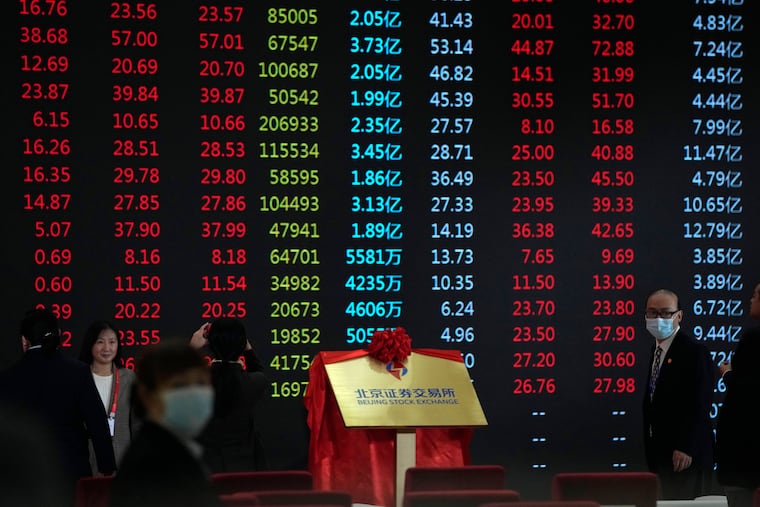Vanguard to launch single-country China Select Stock Fund in 2022 amid delisting of U.S.-traded Chinese companies
This isn't a classic Vanguard index fund. It's a China-only actively managed fund with much higher fees.

In a departure, Vanguard plans to launch an actively managed single-country China mutual fund in 2022, and chose Wellington Management and Baillie Gifford as the portfolio managers, citing a “track record of outperformance in Chinese equity markets.”
The $8.3 trillion fund giant is launching a U.S.-listed China mutual fund, despite Vanguard scrapping its local business in China itself.
Last week, some Chinese companies such as ride-sharing firm Didi dropped plans to list in the U.S., prompting a brutal sell-off in other Chinese companies. A Chinese government crackdown on the technology sector has wiped out roughly $1 trillion of shareholder value this year.
Vanguard in November filed an initial registration statement with the U.S. Securities and Exchange Commission to launch Vanguard China Select Stock Fund in the first quarter of 2022. The fund will invest in both onshore and offshore Chinese stocks and U.S.-listed companies.
“Vanguard research indicates that there is an opportunity for talented active managers to generate alpha in China’s large, but inefficient, equity market,” Kaitlyn Caughlin, head of Vanguard portfolio review department, said in a statement.
China is an “important part of both the equity and fixed income allocations of a globally diversified portfolio,” the firm said, as the world’s second-largest nation by GDP output and the third-largest by stock market capitalization.
And the higher fee makes clear this isn’t a classic Vanguard low-cost index fund, though it is cheaper than competitors. The China Select Stock Fund’s benchmark is the MSCI China All Shares Index and carries an estimated expense ratio of 0.83% for Investor shares and 0.73% for Admiral shares, compared with an average expense ratio of 1.14% for competing funds, Vanguard said.
China’s leader, Xi Jinping, has shaken investors worldwide this year with a pointed campaign to assert state control over the economy. The government has fined big tech companies like Alibaba, the e-commerce titan, and the food-delivery giant Meituan for antitrust violations.
Vanguard took pains to spell out the risks, as this isn’t an index fund: “While the fund may offer ... diversification benefits, the single-country focus may expose investors to more acute investment, geopolitical, and regulatory risks. The fund’s country-specific concentration may drive ... greater volatility relative to the broad market and therefore should be thoughtfully integrated into a globally diversified portfolio.”
China fund a change for Vanguard
“This is a big change,” said Jeff DeMaso, editor and research director for the Independent Adviser for Vanguard Investors newsletter, which follows all things related to the company. “For Vanguard’s U.S. investors, when it comes to foreign markets, the most granular Vanguard has ever gone is to offer regional funds” such as Europe or Asia, he said.
“They’ve never done a Japan fund, even when it was one of the largest economies in the world, nor a Germany fund or a U.K. fund.”
Vanguard’s China Select Stock Fund will be one of the most expensive in Vanguard’s roster.
As for the managers’ track records, the duo from Baillie Gifford — Sophie Earnshaw and Mike Gush — have some good history. Gush has managed a China Equities strategy at Baillie Gifford since 2006, while Earnshaw joined in 2013.
They have delivered outperformance “pretty much nonstop since the pre-global financial crisis peak of October 2007,” DeMaso said. Baillie Gifford’s China Equities strategy has returned 512% (or 12.3% annually) to their benchmark’s 258% gain (or 8.5% annually).
Wellington’s Bo Meunier has run an Ireland-domiciled fund since the end of January 2020, said DeMaso. Since its launch, Meunier’s Wellington All-China Focused Equity has returned 56.6%. That’s slightly ahead of Baillie Gifford’s China Equities’ 50.1% gain.
Both funds outperformed the 15.1% return from the iShares MSCI China ETF, he said.
“It looks like Vanguard has partnered with some talented managers in its first foray into a standalone country fund,” DeMaso said. “I think the Vanguard fund will prove popular, though investors may be hesitant to take on the risks of this China-only strategy.”
Competing China-only and other fund managers say there are plenty of other options, including Jason Hsu, portfolio manager for the Rayliant Quantamental China Equity ETF [symbol: RAYC], an actively managed exchange-traded fund.
“Investors are no longer limited to passive or thematic China ETFs,” he said, referring to exchange-traded funds, which can track an index or sector and still be bought and sold as a stock.
Regarding Vanguard’s timing: “China is at a very interesting time. Investors are fearful that it’s turning its back on capitalism, and that’s a credible fear,” Hsu said. “But [state] interventions happen. It’s not unique to China. You get paid to take risk because valuations are so low right now.”
Perth Tolle, whose Alpha Architect ETF Trust invests in emerging markets, excludes China from the fund right now, based on environmental, social, and corporate governance (ESG) metrics such as human rights abuses and lack of personal freedoms. Tolle is the ETF index provider and sponsor; the fund is managed by Alpha Architect in Horsham.
“Most investors care about shareholder value, and that value destruction comes from high levels of corruption in China and a government that’s now less friendly to business,” Tolle said. “We’ve seen this massive GDP growth over the past 30 or 40 years, but during that time the China stock market index has returned only 2.2% on average.”
The exchange-traded fund’s symbol is FRDM and is a freedom-weighted emerging markets equity strategy using third-party quantitative personal and economic freedom metrics developed by the Cato Institute and others.
“There are many other emerging markets that have higher value capture than China, where companies are free to put shareholder interests above the interests of the state. And we are not willing to miss out on those opportunities to have our risk concentrated in China, where an increasingly capricious government regularly intrudes into private market activity,” Tolle said.